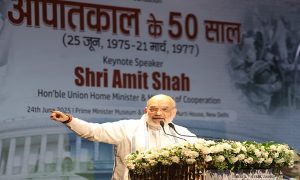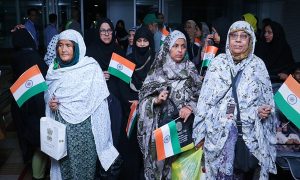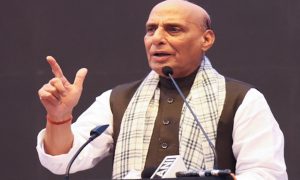When India banned 59 Chinese apps because they were a threat to “sovereignty and integrity of India, defence of India, the security of the state and public order”, media tried to portray it as an act to avenge the Galwan Valley incident. However, the process of monitoring these apps as a threat to Indian security was going on from a long time. Not just that, these apps are also being monitored by other countries such as United States and Australia who are in the process of banning them as well.
The biggest reason why India banned these apps was to counter China’s Military Civil Fusion or MCF strategy. This article seeks to explain what is MCF strategy exactly and how these apps were just a front for the nefarious Chinese designs in India. Military Civil Fusion or MCF written as (军民融合, jun-min ronghe) is a Chinese strategy to exploit dual use technology for military and strategic purposes. Internally within China, MCF means an integration of civil and military administration at all levels of government in China. The motive is to maximize security by putting a single investment in resources or personnel to multiple uses. This also guides recruitment process in China including for the government purpose and research. Externally, it means China is more than willing to use state-owned corporations to invest in civilian sectors in foreign countries and appropriate them for military and strategic use later. The MCF strategy draws its roots from the “whole of society” strategy based on Maoist idea of “People’s Warfare” that recognizes industrial innovation as an important cornerstone for military mobilization and modernization. A precedent to China’s civil military fusion exists in the US’s Defence Advanced Research Projects Agency (DARPA) that has worked on a similar model of utilizing corporate research and development for military purposes. The MCF strategy as implemented by China has also penetrated the startup ecosystem. Chinese government is guiding funds into these start-ups through Venture Capital so that the innovation by them can be later appropriated for military use.
An example of China’s MCF Strategy is Shenzhen-based Kuang-Chi Corporation. Kuang-Chi is on an investment spree in countries such as Israel, Cambodia and Myanmar. It is defined as a typical MCF company in Chinese media. Kuang-Chi’s job is to acquire and invest in key civilian assets abroad that can be later used for military or strategic purposes. It has stakes in aviation, optical fibre, artificial intelligence etc. in these countries. Now there are a 1000 corporations like Kuang-Chi which are spread across the world. Even the private companies in China that invest in new technologies are bound by China’s National Security Law where they can’t refuse the government from cooperating with the country’s military program. According to a report by the US-China Economic and Security Review Commission, China has employed a “whole of society” or military civil fusion strategy to achieve leadership in emerging new technologies especially in sectors such as Artificial Intelligence, New Materials, Energy Storage and Nuclear Power. This strategy is not limited to these sectors alone. In fact, according to this document released by a local government body in China, civilian entertainment is also a part of the MCF strategy.
Now coming back to India’s ban on TikTok and 58 other apps. Much before the Galwan Valley incident triggered India into banning the Chinese apps, United States had already started acting against Chinese apps. Why? Reason was the Chinese strategy of Military Civil Fusion. China is an authoritarian country that indulges in Internet censorship. It doesn’t allow foreign apps in China. A Chinese equivalent of all the popular apps are the only ones that are allowed in China- Tencent (Facebook), Twitter (Weibo), Google (Baidu), Amazon (Alibaba). But Chinese apps are free to penetrate other countries, fully exploiting the fact that they are democracies. These apps are nothing but front for the Chinese Communist Party. Unlike apps of other countries that operate freely, all Chinese apps have a mandate from the CCP to share data with the Chinese government as part of the MCF strategy. There were reports that TikTok might be a Chinese Cambridge Analytica gathering data from users all around the world. What makes it even more dangerous is China’s reputation as an authoritarian country. The Chinese Communist Party’s apparatus is well-entrenched in the country’s university, R&D and corporate sector. All the major Chinese tech companies such as Tencent, Alibaba and Baidu have been accused of associating with the CCP.
In India, these apps were not just a threat to India’s data sovereignty or violation of privacy of the Indian users but they were also indulging in snooping on their employees and spreading fake news. I spoke to a couple of Indian journalists who were approached for jobs by these apps. They were offered a raise of more than 50% where the management was strictly Chinese. They had a job brief to expand reach of Chinese apps in India. Their employees are advised to use the company’s own chat client and laptop for all the official work. After India banned the 59 Chinese apps, China retaliated by banning access to Indian news websites in its territory. Indian news websites can’t be accessed even with a Virtual Private Network in China because of a technically advanced firewall that CCP uses. The step by India to ban access to Chinese apps was a much needed one. But it is still short of dealing with the MCF strategy on an adequate basis. Hope the government is listening.
About the Author

Dr. Monica Verma is a PhD in International Relations from South Asian University. Her research focuses on South Asia, Political Economy and Indian Politics. She tweets at: @trulymonica..





























 WhatsApp us
WhatsApp us